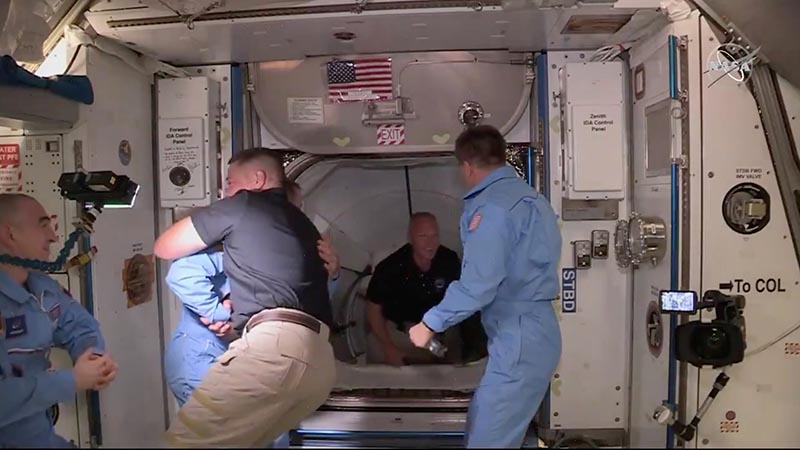SpaceX Crew Dragon delivers two NASA astronauts to International Space Station
Nearly 24 hours after launching from Florida, SpaceX's Crew Dragon capsule delivered NASA astronauts Bob Behnken and Doug Hurley to the International Space Station on Sunday, marking the first US space capsule to do so with a crew since 2011. The space station's current crew welcomed them aboard with hugs and handshakes on schedule at 1:25 p.m. EDT, after executing a critical spacecraft docking milestone and kicking off the crew's potentially months-long stay in the orbital laboratory.
NASA resumes human spaceflight from US soil with historic SpaceX launch
SpaceX, the private rocket company of billionaire entrepreneur Elon Musk, launched two Americans into orbit from Florida on Saturday in a landmark mission marking the first spaceflight of NASA astronauts from US soil in nine years. A SpaceX Falcon 9 rocket lifted off from the Kennedy Space Center at 3:22 p.m. EDT (1922 GMT), launching Doug Hurley and Bob Behnken on a 19-hour ride aboard the company's newly designed Crew Dragon capsule bound for the International Space Station.
Prototype of new SpaceX rocket Starship explodes on Texas test pad
A prototype of SpaceX's upcoming heavy-lift rocket, Starship, exploded on Friday during ground tests in south Texas as Elon Musk's space company pursued an aggressive development schedule to fly the launch vehicle for the first time. The testing explosion was unrelated to SpaceX's upcoming launch of two NASA astronauts from Florida's Kennedy Space Center using a different rocket system, the Falcon 9 with the Crew Dragon capsule fixed on top.
Millipede from Scotland is world's oldest-known land animal
A fossilised millipede-like creature discovered in Scotland may represent the oldest-known land animal, a humble pioneer of terrestrial living 425 million years ago that helped pave the way for the throngs that would eventually inhabit Earth's dry parts. Researchers said the fossil of the Silurian Period creature, called Kampecaris obanensis and unearthed on the island of Kerrera in the Scottish Inner Hebrides, inhabited a lakeside environment and likely ate decomposing plants. Fossils of the oldest-known plant with a stem, called Cooksonia, were found in the same ancient lake region as Kampecaris.






